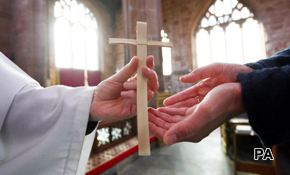What do you think about how Religious Education is taught in schools?
Should there be a focus on Christianity or other religions – or should there be no RE teaching at all? Why teach RE?
Michael Gove MP, the Education Secretary, has recently sparked debate on this issue by choosing not to include Religious Education as a core subject in schools – which has prompted a group of MPs to come together to 'safeguard', as they see it, the teaching of Religious Education (RE) in England.

When we asked for participants' views on this potentially sensitive issue, responses ranged from those who felt that religion should be a prominent subject and help 'reflect the values in our society', to others who said that religion should be taught elsewhere and that time in schools could be used more effectively. Others thought that RE in schools should teach a broad range of religious opinions.

What do you think about how RE is taught in schools? Join the debate by using Disqus below

Here's what our PoliticsLabs participants had to say...
1. RE in schools should primarily teach about Christianity
Argument 1: Schools should focus on the primary religion of the country
“Pupils should be taught the religion of the country. However we have to live all together so pupils should be taught other religions so that one respects all the alternatives” Francis, Wales

“Where the majority of people in the class are from a Christian background that religion should be taught” Laurie J, Dorset
“Christianity is the recognised belief in the UK; if I lived abroad I'd expect to defer to their religion” Ann, Kent
“Britain has been a Christian country for a long time and therefore Christianity should be the main faith covered, with other faiths all being covered at a lesser degree” Anon
Argument 2: Understanding Christianity is key to understanding British society
“Britain is historically a Christian country; to understand the history of Britain you must understand Christianity” Anon
“If children are to grow up with and understanding of and empathy with British culture then they need to know what lies at its basis” Anon
“It is important that all faiths be taught and understood in a multicultural society, and a globalised world, but the Christian faith should take precedence in that our culture is based on the Christian faith. This includes its being the foundation for our laws and legal system, our language and literature, and even the great festivals of the year, which have distinctive religious and secular identities” Daniel C, London
“Parliament and the legal system, art, music, language and society have all been heavily influenced by Christian values. We should teach children this to give them a sense of identity, not to mention the positive message that Christianity has about caring for others first” Anna, Birmingham
Argument 3: It is important to preserve Christian values
“This country is based upon protestant Christian values; all children should learn these in addition to their parents' religion” Anon 
“It supplies the values that are urgently needed in this society” Phil G, West Malling
“We have a long history of Christian heritage in this country. In the past this has given a strong national identity, values and moral codes by which our society has been shaped” Anon
“Foundation for good citizens and covers everything that is missing in today’s society” Anon
“There may be fewer churchgoers than a generation ago but I still believe that Christian values should be promoted” Anon
“Many people have come to Britain in the past and have been happy to accept their new culture and ethnicity. Being a Christian country gives people values and heritage” Anon
Argument 4: Other religions can be taught outside school
“We live in a Christian country with a Christian heritage. If people believe in other faiths they should have the option to drop out or they could go to a faith school” Peregrine R-S, Hampshire
“We are a Church of England country and other faiths are taught at home” AJG, Essex
“Our Queen is the Head of the Church of England so that should be the prominent faith in schools. Other religions have their own religious schools at the weekend” Shez, Berkshire
“I do not think that any more than a maximum of 1 hour a week should be devoted to RE. If parents wish to teach their children any further then this should be done in non-school time” Anon
“If other faiths need to be taught then they should provide and pay someone to come and teach their faith in our schools, or opt out and just teach in their place of worship”
2. All faiths should be taught equally
Argument 1: It improves tolerance towards others

“Students should be encouraged to learn as much as possible about their fellow human beings and, hopefully, one day this will apply to all countries” Anon
“Information is the basis of understanding. People will always disagree, depending on their views but if children are taught the basics of other faiths when young, maybe it will lead to a greater tolerance of all faiths because if not, we are all in big trouble in the future” Adi P, Wales
“It is only by understanding people that we can build peace and get rid of the religious hatred that appears to dominate so much of the news” Peter L, Milton Keynes
“RE in schools should also cover minor faiths as well humanism and other 'non-religious' viewpoints. It is important that children learn about the beliefs of others in order to foster and atmosphere of religious tolerance” Simon C, Wiltshire
“If we could all study each and every faith it would take the fear away and hopefully trust would grow from this. No better place to start than in schools so the adults of tomorrow will avoid our narrow view of the unknown” Greg, Cornwall
“I think that it would improve interfaith relations enormously if young people learned about others' belief systems” Gerry S, Bedfordshire
Argument 2: Children should be allowed to choose for themselves
“All teachings should be covered to allow children to make up their own minds and not become biased in their opinions (or rather their families opinions)” Anon

“There are many different faiths in the world and increasingly in Britain and you should empower your student to choose or not choose what they want to believe. By focusing or predominantly only teaching one religion you are presenting a bias” Clo, Edinburgh
“I think it's important for children to be aware of other religions and respect their different beliefs. In order to choose (or not) their own religion, it is important to understand all religions” H Moss, Huddersfield
“RE lessons should be balanced and pupils should be given the necessary information to make an informed choice about what religion they want to follow (if any). In the early years it will probably be the parents' choice, but when children get older they will want to make their own decision about religion” Anon
“Not only should it teach about all the major faiths, it should teach about having no faith” Chris, Coventry
Argument 3: It's important to understand our multicultural society
“We live in a global community with a multitude of different faiths and beliefs and our children need to understand at an early age, that there is not just one predominant religion or belief. In this way we may inject a higher degree of tolerance into future generations and perhaps a less bigoted approach” lagonda, Shropshire 
“To prevent a narrow minded and biased view on the world. This is a multi-cultural society and civility to our neighbours is born out of understanding” Anon
“So all children can learn about each religion in equal measures and that the children that follow each faith don't feel like their religion is being ignored and/or left out” Charlotte N, Lincolnshire
“As a multi-cultural country, I believe it is essential for children and young people to learn about all the major faiths, in order to be understanding of other people they meet in their adult life” Rose, Somerset
“Britain is multicultural, so no faith should be ignored or pushed aside in favour of another” Alex, Stockport
Argument 4: To gain a better academic understanding of religion
“To provide a full education and understanding of religion in society including how religion relates to power and social conditions and consider the view that religions are manmade” Anon
“Children should be informed about all aspects of religion. We don't teach one aspect of History or Geography. Why should RE be any different?” Anon
“RE is about educating children about religion and therefore should do that. It’s not called Christian Education, or main accepted religions education etc. and should therefore cover as many as possible - even those not considered major” Ianthe, Merseyside
“Knowledge of the basic tenets and customs of all the different faiths explains many of the different world cultures and attitudes” Anon
“I believe that RE lessons, if they are taught in a school, should be less about trying to get children to pick a religion and more about understanding different faiths around the world” Anon
“Provide the information, and that's it. It is up to parents to bring their children up in their faith, not schools” Anon
3. RE should not be taught in schools at all
Argument 1: Religious faith is a personal choice

“I think that faith and religion are individual and personal issues and should not be forced on young people. Religion is often open to interpretation, depending on which texts being used, and is of little use to adult life” Tracie, Somerset
“Religion is a deeply personal belief and should be completely separate from education. We should follow the French/American system and all religion should be kept out of schools” Anon
“Religion is a very personal thing and so should be taught by the family to which you belong” Anon
“It should be left up to the child whether they want to follow any religion when they are older” Angela, Dronfield
“All religious education is indoctrination and RE should be a personal thing followed by families who wish to do so” Ian M, Suffolk
“This is a very personal and emotive issue. Families should teach their children about their own beliefs. Children can then research other religions if they feel the need” Helen E, York
Argument 2: It is too difficult a subject to teach properly in schools
“You cannot teach about all religions in a fair, unbiased way” Anon
“Only someone who follows that faith is capable of giving a true teaching of it. Children, in fact all people should not be forced into learning about religion in depth” Anon
“Having taught in primary schools for almost forty years I have found the RE curriculum unbearably bland. This, I believe, was to render delivery of a religion totally unobjectionable to any religious group. Whilst not wanting RE to be included onto the curriculum, I do think it important that cultural differences be discussed and celebrated - perhaps this would be best included within the subject of Citizenship” GJ, Yorkshire
“Based on personal experience, it is a subject that cannot be taught without the teacher imposing at least some of their own beliefs and implying that those beliefs are superior in some way” Jenny F, Hampshire
“To expect RE to be taught in an unbiased way in every school would be impossible. Far better to include it in a subject such as History or Geography where we can state how religion has contributed (or not) to the society of various countries” Donna, Hampshire
Argument 3: Lessons at schools should be practical/fact-based
“Religion is often open to interpretation, depending on which texts being used and is of little use to adult life” Tracie, Somerset

“Children should be taught academic subjects in school and by removing RE from the timetable, that will also free up time for more PE / Sport” Jim, Blackburn
“Facts with clear evidence should be taught in schools and pupils encouraged to think freely for themselves. Religion by its very nature is a belief unsupported in evidence and reality” Shirley, Ringwood
“I think RE should be offered as an optional subject at GCSE and A Level and that schools should be able to teach it if they want to, but there should also be an option to not teach RE and to spend the hour a week when it would be taught on another subject” Anon
“Only factual subjects should be taught in schools, at least until children can choose their own subjects and make up their own minds” John P, Cambridge
Argument 4: School is not the place for religion

“We have churches, Sunday schools and clergy for that sort of thing” R.E.W, Southhampton
“If parents wish their children to be brought up in a particular faith they can teach their children themselves at home or send them to a particular Sunday School” Jim, Blackburn
“Not the job of teachers to promote faiths of any description” Anon
“State education should be secular in nature. Religion should be taught in the churches and the mosques and temples and in the families own time” H Bedford
“Giving children a sense of morality & right-thinking behaviour is not going to come from studying religious texts & practices. It should come from example & discussion. If parents wish their children to learn particular doctrines, then they should provide it outside school” JN, Suffolk
“Religious education should remain within the religious community; I would prefer school time to be spent on proper education” Peter, Bourne

What do you think about how RE is taught in schools? Join the debate by using Disqus below

Follow and discuss: @YouGovLabs on Twitter






